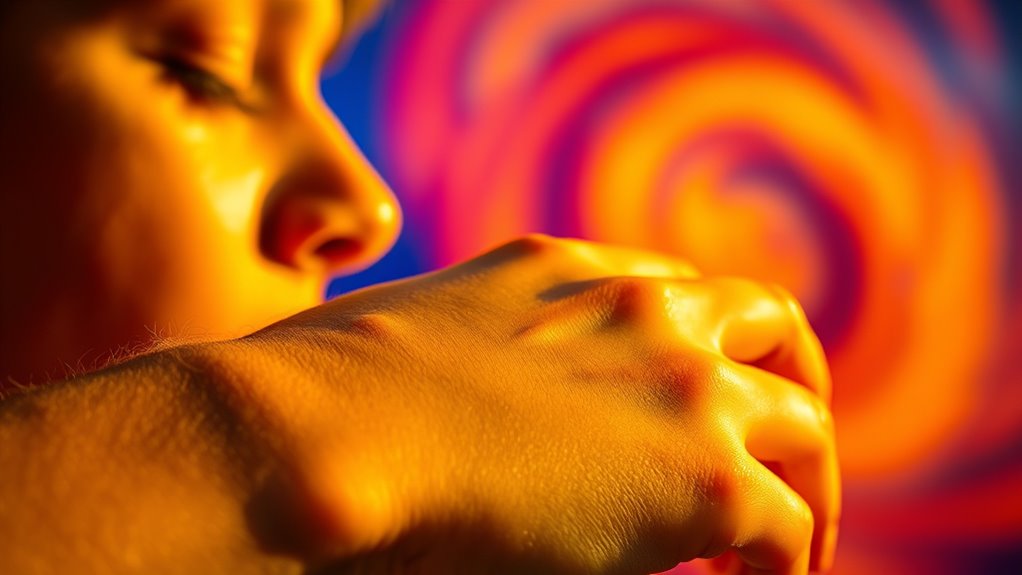When you experience goosebumps from music, it’s your brain responding to emotional peaks like swelling melodies or powerful lyrics. These moments activate your emotional connection, triggering physical reactions as your brain mimics the intensity. Elements like sudden crescendos or memorable tunes deepen this bond and amplify sensations. Factors such as sound quality and personal memories also play a role. If you want to understand more about how music deeply moves you, keep exploring these fascinating connections.
Key Takeaways
- Emotional peaks in music activate the brain’s emotional processing, leading to physical responses like goosebumps.
- Sudden musical cues and powerful vocal delivery can trigger heightened emotional and physical reactions.
- Personal memories or feelings aligned with specific music intensify emotional engagement and goosebumps.
- The brain’s resonance and empathy with music amplify emotional intensity, causing physical sensations.
- High sound quality and contrast enhance emotional peaks, increasing the likelihood of goosebumps.

Have you ever experienced a sudden rush of chills while listening to a song? That spine-tingling sensation, often called goosebumps, can feel almost involuntary. It’s a powerful response that’s rooted in your brain’s ability to connect deeply with music. When you experience this, what’s happening is a complex interplay of emotional peaks and musical empathy. Your brain doesn’t just process notes and rhythms; it tunes into the emotional signals behind the music, creating a profound connection that can trigger physical reactions. This isn’t just about hearing sounds—it’s about feeling them on a visceral level, as if the music is speaking directly to your emotions.
A sudden rush of chills from music reflects your brain’s deep emotional connection and empathy.
Musical empathy is vital here. It’s the ability to emotionally understand and resonate with the feelings conveyed through a song. When the music hits emotional peaks—those moments where the melody swells or the lyrics evoke a strong sentiment—your brain reacts as if you’re experiencing those feelings firsthand. This empathetic response heightens your emotional state, making you more susceptible to physical sensations like goosebumps. Fundamentally, your brain is mimicking the emotional intensity, which amplifies the physical reaction. It’s like your mind is experiencing the music’s emotional journey as if it were your own, intensifying the effect and making those chills more likely to occur.
Certain musical elements can heighten this experience. For example, a sudden crescendo, a powerful vocal delivery, or a poignant lyric can all serve as triggers for emotional peaks. When these moments align with your personal memories or feelings, the effect is even stronger. Your brain recognizes the significance of these cues and responds with heightened emotional engagement, which in turn stimulates the nervous system. The result? Goosebumps ripple across your skin as a physical manifestation of your emotional response.
This phenomenon isn’t random; it reflects your brain’s remarkable ability to connect emotionally with music. When you’re fully immersed and your musical empathy is engaged, you become more vulnerable to those emotional peaks. Whether it’s joy, awe, nostalgia, or even a sense of transcendence, these feelings are deeply rooted in your emotional processing system. The physical response—goosebumps—is your body’s way of signaling that it’s experiencing a profound emotional moment. So, next time you get chills listening to your favorite song, remember it’s your brain’s way of celebrating the deep, emotional connection you share with the music. Additionally, research into the contrast ratio of the music and sound quality can influence how intensely you experience these emotional peaks, further amplifying your physical reactions.
Frequently Asked Questions
Can Watching Visual Stimuli Also Trigger Goosebumps Like Music?
Watching visual stimuli can indeed trigger goosebumps, just like music. Your emotional responses to powerful images, scenes, or even certain colors can cause physical reactions, including goosebumps. Visual triggers tap into your emotional system, activating your body’s fight-or-flight response or feelings of awe. So, when you experience intense or moving visuals, your body might react similarly to how it does with music, showing how deeply interconnected your senses and emotions are.
Do Certain Genres of Music Cause More Goosebumps Than Others?
Imagine standing at a concert, feeling the rush of a powerful ballad—certain genres, like classical or soul, often deliver this emotional impact. Your body responds with goosebumps more frequently because these genres tend to evoke strong emotions through genre specificity. If a song resonates deeply, it heightens your emotional response, making you more likely to experience those chilling sensations. So, yes, some genres are more likely to trigger goosebumps than others.
How Does Individual Music Memory Influence Goosebump Responses?
Your personal memory and emotional associations heavily influence your goosebump response to music. When a song reminds you of a meaningful moment or feeling, it creates a strong emotional connection. This connection activates your nervous system, often triggering goosebumps. So, if a particular melody evokes a deep personal memory, you’re more likely to experience those tingling sensations, as your brain links the music to powerful emotions.
Are There Specific Frequencies That Are More Likely to Trigger Goosebumps?
Imagine your hair standing on end like static sparks—that’s your body’s response to certain sounds. Specific frequencies, especially in the high-pitch range, are more likely to trigger goosebumps because of your frequency sensitivity and pitch perception. These sharp, intense sounds stimulate your nervous system, creating a visceral reaction. So, yes, higher frequencies tend to be more potent in sparking that shiver, tapping into your body’s deep-seated reactions.
Can Hearing Loss Affect the Likelihood of Experiencing Music-Induced Goosebumps?
Hearing loss can affect your chances of experiencing music-induced goosebumps, especially if it involves damage to your auditory nerve. If you have hearing impairment, you might not perceive the full emotional impact of music, which could reduce the likelihood of goosebumps. The auditory nerve plays an essential role in transmitting sound signals, so any impairment can diminish your sensory response, including those physical reactions like goosebumps.
Conclusion
So, next time a song sends shivers down your spine, remember it’s your brain’s way of throwing a surprise party for your emotions. Those goosebumps are like tiny fireworks, lighting up your skin to celebrate a powerful moment. Music has a magic all its own, turning simple sounds into a symphony of feelings that make your soul dance. Embrace it—those moments are your brain’s way of saying, “This is special.”









